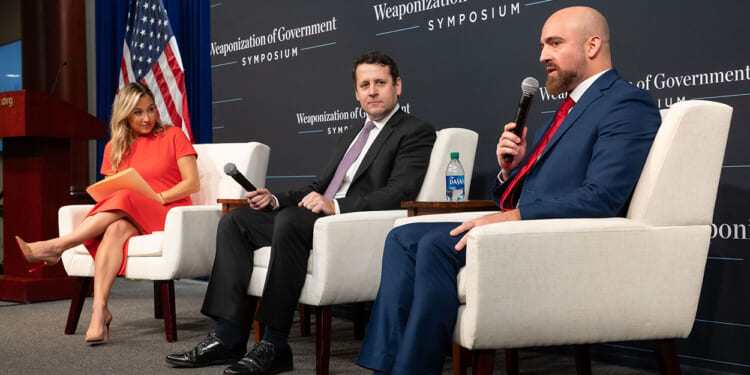The foreign policy establishment that once thrived under the control of both political parties has used Big Tech and the Biden administration to codify a “war on wrongthink” that stifles dissent from the elites’ narrative, a journalist and an online censorship analyst warned.
“What we’re up against here are not pink-haired, ambi-gendered LGBT-BLM-maximizing identitarian politics when we’re talking about censorship on the internet,” Michael Benz, a former State Department official under President Donald Trump and founder of the Foundation for Freedom Online, said Tuesday at an Oversight Project event at The Heritage Foundation.
It’s not “partisan politics” driving censorship, said Benz, but “the foreign policy establishment.” Conservatives and populists “don’t think about the American empire, they don’t think about the managers of the American empire, which is the foreign policy establishment, our State Department, our Pentagon, our intelligence services.”
“When you go upstream on internet censorship and what’s driving it, you will find that foreign policy establishment,” Benz argued.
Benjamin Weingarten, editor-at-large at RealClearInvestigations, also attributed “the leading edge of all the attacks on Donald Trump as an avatar for tens of millions of dissenting Americans” to the administrative state and the “deep state” within it. (The “deep state” refers to bureaucrats who oppose the agenda of the duly-elected president.) These entrenched bureaucrats “felt most threatened that [Trump] would upend the uniparty foreign policy blob,” he said.
“You also had the tech companies identify that what happened in 2016 could never happen again,” Weingarten said, referring to both the Brexit referendum and Trump’s election victory.
“They kind of used the pretext of Russian mis-, dis-, and malinformation, grafting a Cold War paradigm” to define a new enemy—Americans who disagree with their agenda, he said. “We are the enemy that’s engaging in wrongthink that threatens to undermine their power.”
After 2016, “Big Tech platforms became perceived as—rather than vehicles for free and open discourse—now they needed to be weaponized as assets of this security state, essentially.”
These bureaucrats used the Capitol riot on Jan. 6, 2021, as a pretext to launch “a National Strategy for Countering Domestic Terrorism,” Weingarten claimed, referring to the Biden White House strategy released in June 2021.
He warned that the strategy “codifies a war on wrongthink in this country,” based on the idea that “you can’t have an information environment that enables what we saw on Jan. 6.” He described as “terrifying” the idea that the federal government would take upon itself the task of “confronting the longterm contributors to domestic terror” in the context of the misinformation panics of the Trump-Russia collusion narrative and the COVID-19 pandemic.
Benz, the former State Department official, highlighted what he called the “foreign-to-domestic switcheroo,” noting that federal powers created to oppose terrorism in the War on Terror became tools to silence dissent at home.
The narrative that Donald Trump represented a threat to the U.S. from Russia enabled the foreign policy establishment to target conservatives, he said. Yet special counsel Robert Mueller’s report found no smoking gun evidence of Trump as a Russian agent, so the establishment had to move on to something else.
“Instead of shutting down the censorship apparatus when Russiagate died, they changed the predicate,” Benz noted. Suddenly, the foreign policy blob started warning about “a threat to democracy.”
“Democracy is the watchword of the foreign policy establishment to overthrow governments,” Benz said.
He noted that the National Science Foundation has given over $60 million in the past year to “specially-constructed censorship labs” to study “misinformation as a threat to democracy.” This bolsters “the ability to overthrow a government that is not doing the bidding of the U.S. foreign policy establishment,” he warned.
Benz described a symposium with “some of the most important thought leaders in the industry” convened after Space X founder Elon Musk purchased Twitter, now known as X.
Benz said the “censorship industrial complex” suffered a serious setback when Musk purchased Twitter and with the Murthy v. Missouri Supreme Court case revealing the extent to which the federal government pressured social media companies to censor dissent during the COVID-19 pandemic. Yet he said the censors still have “two tricks” up their sleeves.
He explained that the European Union Digital Services Act—which he dubbed “the NATO censorship law”—intends to “stop the rise of populist parties,” going beyond “the simple hate speech laws” in Europe to establish a new rule on disinformation.
“You cannot be a multinational tech platform without access to the EU market,” Benz warned. This disinformation rule will come from “the same people who constructed the election censorship apparatus in 2020,” which urged Big Tech to censor concerns about voting by mail, for example.
He also warned about state governments launching “state-mandated programs on media literacy” in public schools, teaching students that “if you read the wrong media sources, you are illiterate.”
The “censorship industrial complex” is becoming an industry employing millions of people,” Benz warned.
Benz said Americans need to pressure Congress to cut funding to the “censorship industrial complex.”
Weingarten, the RealClearInvestigations editor, agreed, saying that “cutting off the federal funding … is imperative.”
“I would advocate for criminal penalties” for those who use social media and “misinformation” programs to censor Americans, he added. “There’s a censorship-to-criminalization pipeline and all we have is oversight? There needs to be something more than oversight.”

